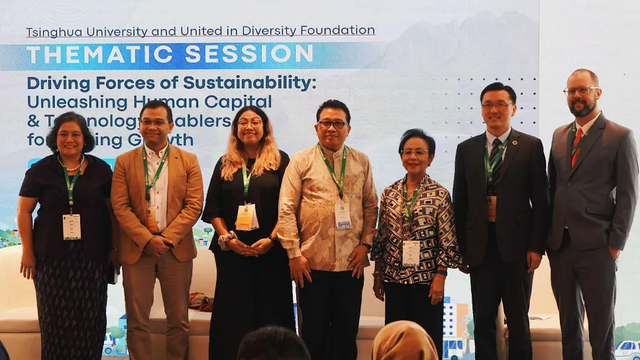SDSN Southeast Asia's and SDSN China Hub Host Institutions at the Indonesia Sustainability Forum 2023
The Indonesia Sustainability Forum (ISF) 2023 (ISF), held on September 7–8, 2023, took center stage in Jakarta, uniting global leaders and experts to discuss the urgent need for sustainability. The ISF concluded its monumental debut with the collective voices of global leaders emphasizing the urgency of sustainability efforts and innovative collaboration. This inaugural international-scale sustainability forum welcomed over 700 international participants and more than 100 esteemed speakers from various sectors, positioning Indonesia at the forefront of global sustainability discourse.
Key Takeaways
- Universities can serve as hubs for industry and academia to collaborate on sustainable technology.
- Policymakers, educators, and researchers need to work collectively to align their sustainability objectives.
- The Ministry of Education, Culture, Research, and Technology of Indonesia is working to integrate sustainable development across all levels of education through the Emancipated Learning Program, through which education institutions can collaborate with industry to work on tackling challenges and creating solutions related to Sustainable Development Goals (SDGs).
Spread over two days, the forum hosted 10 high-impact plenary sessions, where prominent figures from the government, multinational organizations, businesses, and sustainability experts discussed pivotal enablers and opportunities in decarbonization and a sustainable economy. Among the notable attendees were the President of Indonesia, Joko Widodo, the Prime Minister of Papua New Guinea, James Marape, the President of the Philippines, Ferdinand Romualdez Marcos Jr., and the Managing Director of the International Monetary Fund (IMF), Kristalina Georgieva. Participants came from various backgrounds, such as policymakers at the ministerial and deputy levels, C-level executives from both overseas and domestic companies, representatives from intergovernmental organizations, think tanks, national civil society organizations, philanthropies, and a myriad of industry associations dedicated to sustainability.
Driving Forces of Sustainability
SDSN China Hub's host institution, Tsinghua University, and SDSN South East Asia's host institution, United in Diversity Foundation, co-hosted a standout session titled “Driving Forces of Sustainability: Unleashing Human Capital & Technology Enablers for Lasting Growth.” The session featured a panel of experts emphasizing collaboration between academia, industry, and policy for a sustainable future, with key takeaways including the role of universities as hubs for sustainable technology, the need for collective action among policymakers, educators, and researchers, and Indonesia's commitment to integrating sustainability into education through the Emancipated Learning Program. The event concluded with a call for long-term planning and collaborative partnerships to ensure a sustainable future.
The heart of the session was a panel discussion featuring notable experts:
- Teacher. Zhu Xufeng, Dean of the School of Public Policy and Management, Tsinghua University
- Shobi Lawalata, Director of the Academic and Learning Program, and Associate Professor at UID
- Rizky Fauzianto, Indonesia Country Manager at Rocky Mountain Institute (RMI)
- Teacher. Dr. Ir. Kadarsah Suryadi, DEA, Secretary of the Indonesian Higher Education Council
While the panel included a blend of experts from various sectors, the underlying theme was clear: harnessing the collective strength of academia, industry, and public policy to drive sustainable transformation.
Teacher Zhu Xufeng touched on the importance of educational institutions, asserting, "Our role extends beyond imparting knowledge. We're here to shape the innovators and leaders who will chart our sustainable future."
Shobi Lawalata brought forth the significance of engaging all stakeholders, including local communities, in this global effort, reminding attendees of the essential “ gotong-royong ” spirit that can fuel widespread change.
Looking Ahead
With discussions spanning technology's role in sustainability, the importance of adaptive education systems, and the need for cohesive international strategies, the session provided a comprehensive blueprint for the path forward.
“As we move forward, we have to remind ourselves that the planet is not ours but borrowed from future generations,” said Prof. Dr. Ir. Kadarsah Suryadi. This sentiment encapsulated the event's emphasis on long-term planning and collaboration among all sectors of society for a sustainable future.
The session concluded with a thought-provoking Q&A segment, which delved into the role of political will in steering future policies for sustainability, and was gracefully closed by Ms. Tuti Hadiputranto, Chair of the Board of Trustee, United in Diversity (UID), reminding attendees of the journey ahead and the partnerships required to navigate it effectively.
Those who missed the event can access the event recording for more information.
